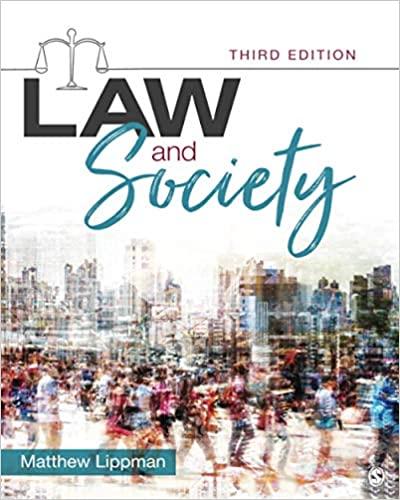Question
Case Scenario B: The following Case Summary 5.2 can be found on page 136 in the text: Neighbours Are Owed a Duty of Care: Donoghue
Case Scenario B:The following Case Summary 5.2 can be found on page 136 in the text: "Neighbours" Are Owed a Duty of Care: Donoghue v. Stevenson.The reasonable foreseeability test was developed in Donoghue v. Stevenson, one of the most significant cases of the twentieth century. Mrs. Donoghue went with a friend into a caf, where the friend ordered a bottle of ginger beer for her. After consuming some of it, Donoghue discovered part of a decomposed snail at the bottom of her bottle. She became very ill as a result of drinking the contaminated beverage. In the process of suing, she discovered that she had some serious problems. She could not successfully sue the caf that had supplied the ginger beer for breach of contract; she had no contract with the establishment, since her friend had made the purchase. Similarly, she could not successfully sue the caf for negligence since it had done nothing wrongthe ginger beer was bottled in an opaque container and served to her in the bottle. Her only recourse was to sue the manufacturer for negligence in producing the product, but the bottler claimed it owed her no duty to be careful. The Court had to determine whether a duty to be careful was owed by the manufacturer to the consumer of its product. In the process of finding that such a duty was owed, the House of Lords developed the reasonable foreseeability test. Lord Atkin, one of the judges in the case, made the following classic statement when discussing how to determine to whom we owe a duty:
The rule that you are to love your neighbour becomes in law, you must not injure your neighbour; and the lawyer's question "Who is my neighbour?" receives a restricted reply. You must take reasonable care to avoid acts or omissions which you can reasonably foresee would be likely to injure your neighbour. Who, then, in law, is my neighbour? The answer seems to bepersons who are so closely and directly affected by my act that I ought reasonably to have them in contemplation as being so affected when I am directing my mind to the acts or omissions which are called in question.
Indicate why the Donoghue v. Stevenson case (the snail in the ginger beer bottle) was so important in the development of negligence law.
Step by Step Solution
There are 3 Steps involved in it
Step: 1

Get Instant Access to Expert-Tailored Solutions
See step-by-step solutions with expert insights and AI powered tools for academic success
Step: 2

Step: 3

Ace Your Homework with AI
Get the answers you need in no time with our AI-driven, step-by-step assistance
Get Started


